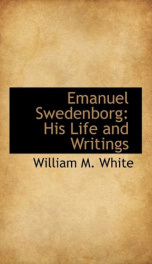emanuel swedenborg his life and writings

Purchase of this book includes free trial access to www.million-books.com where you can read more than a million books for free. This is an OCR edition with typos. Excerpt from book: the forehead by a cannon-ball, his hand clutched his sword, and with a deep sigh he fell dead on the parapet. His attendants rushed forward, lifted his body, and Megret exclaimed, " There, the play is over; let us begone." CHAPTER III. SCIENCE AND SPECULATION. Ulrika Eleonora, sister to Charles XII., succeeded to the throne, but soon resigned the crown to her husband, Frederick, Landgrave of Hesse Cassel. Shortly after her accession, in 1719 she complied with Svedberg's pertinacious prayer and ennobled his sons. On this occasion Emanuel's surname was altered from Svedberg to Swedenborg. The Swedish Diet consisted of four houses: the nobles, the clergy, the burghers, and the peasants or landholders who were not nobles. The house of nobles was composed of upwards of two thousand members, and it was into this crowd that Emanuel was introduced, but was thereby created neither Count nor Baron, as some persist in calling him. Sweden had suffered so severely from the despotism of Charles XIL, that the Diet resolved to put some check on the kingly power. To this Bishop Svedberg was warmly opposed. He thought that absolute power belonged to the King by Divine right, and he saw many administrative advantages in the King's will being supreme: one had only to gain access to the King and hear his Yea or Nay, instead of running from office to office and enduring delay after delay when the least matter required attention or execution ; he therefore vehemently denounced any change, saying in the Diet, that " No King was read of in Scripture with the limited power you would give the Queen, and I abhor the ambition of men who aspire to be Kings of Kings." His opposition was construed into selfishness; Kings and Queens had proved very beneficial to him, and it was no more thannatural tha... --This text refers to an alternate Paperback edition.
Info about the book
Author:
Series:
Unknown
ASIN:
B0006E6AIG
Rating:
4/5 (5)Your rating:
0/5
Languge:
English
Users who have this book
Users who want this book
What readers are saying
What do you think? Write your own comment on this book!
write a commentif you like emanuel swedenborg his life and writings try:
Other books by this author
Do you want to read a book that interests you? It’s EASY!
Create an account and send a request for reading to other users on the Webpage of the book!


